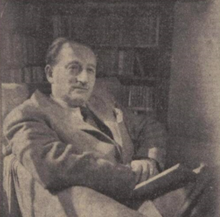Paul Tabori
Paul Tabori | |
|---|---|
 Paul Tabori | |
| Born | Pál Tábori 16 November 1908 Budapest, Hungary |
| Died | 9 November 1974 (aged 65) London, United Kingdom |
| Pen name | Peter Stafford,[1] Christopher Stevens[2] |
| Occupation | Author, journalist, screenwriter, psychoanalyst |
| Language | English |
| Nationality | Hungarian, British |
Pál Tábori (16 November 1908 – 9 November 1974), also known as Paul Tabori,[3] and by his pen names Paul Stafford[1] and Christopher Stevens,[2] was a Hungarian-born author, journalist, screenwriter[4] and psychoanalyst. He was known for his diverse range of writings, which covered a wide array of topics including history, psychology, popular science, and fiction. Tabori's works were often characterized by his engaging writing style and his ability to make complex subjects accessible to a broad audience.
Life
Pál Tabori was born on 16 November, 1908, in Budapest, Hungary,[5] the son of the journalist Cornelius Tabori and Elsa, née Ziffer. George Tabori was his younger brother. Tabori grew up in a bilingual and cultured Jewish family.[6] He studied in Vienna and Berlin, where he earned a Ph.D. in psychology. Tabori's background in psychology influenced his later writings, particularly his interest in the human mind and behavior.[citation needed]
In the 1930s, Tabori worked as a journalist and editor in Berlin. However, due to the rise of Nazi Germany and the increasing persecution of Jews, he was forced to flee the country. He settled in England in 1937, initially working as a journalist for the Daily Mail and the BBC.[7] He became a British citizen in 1947.
Tabori's literary career took off in the 1950s and 1960s. He authored numerous books that explored a wide range of subjects. Some of his notable works include The Anatomy of Exile, which examined the experiences of refugees and exiles, and The Natural Science of Stupidity,[8] a lighthearted exploration of human folly. He also wrote several historical works, such as The Byzantine Background to the First Crusade and The Sultan's Fool, a biography of a Hungarian traveler in the Ottoman Empire.
Additionally, Tabori delved into the realm of fiction, producing novels and plays. His novel The Green Rain[9] dealt with the Holocaust, reflecting his personal history and experiences. Tabori also adapted the works of other authors for the stage, including the plays of Franz Kafka.
In addition to his writing career, Tabori practiced as a psychoanalyst and was a member of the British Psychoanalytical Society.[citation needed] His psychological insights often found their way into his works, adding depth and understanding to his explorations of various topics.
Tabori founded the International Writers Guild, and was active in PEN International.[2]
Paul Tabori passed away in London on 9 November, 1974.[6]
Works
Fiction
- Private Gallery. A Collection of Stories (1944)
- Broken Sleep (1947)
- Solo (1948)
- The Green Rain (1951)
- The Art of Folly (1956)
- The Sultan's Fool (1953)
- A Shadow on the Sun (1954)
- The Tortoise Shell (1956)
- The Sinner (1957)
- The Violins of Saint-Jacques (1958)
- Gideon (1958)
- The Puppet Show (1967)
- The Sinner and the Amnesiac (1969)
- The Demons of Sandorra (1970)
- The Last Waltz in Vienna (1971)
- Strangers in the Land (1975, posthumously published)
Non-fiction
- The Anatomy of Exile (1945)
- The Natural Science of Stupidity (1951)
- The Byzantine Background to the First Crusade (1951)
- The Anatomy of Grief (1961)
- Eva Braun: Hitler's Mistress (1961)
- The Devil and the Jews: The Medieval Conception of the Jew and Its Relation to Modern Anti-Semitism (1961)
- Secret Army: The Story of the SOE (1962)
- The Forgery (1965)
- Legacy of Silence (1965)
- The Great Betrayal: The Story of Burgess and Maclean (1967)
- The Anatomy of Power (1969)
- The Nuremberg Mendacity (1972)
- The Hump (1973)
- The Moral Disaster (1973)
- The Rape of Palestine (1974)
- The Jew and the Enemy: How Jacob Obermayer Saved the World (1975, posthumously published)
- Before Our Time: A Memoir of Hungary (1978, posthumously published)
References
- ^ a b Carty, T. J., ed. (2015). A Dictionary of Literary Pseudonyms in the English Language. Routledge. p. 203. ISBN 9781135955786.
- ^ a b c "Dr Paul Tabori: Author and champion of authors' rights". The Times. 12 November 1974. p. 17.
- ^ "Paul Tabori (Pál Tábori) - National Portrait Gallery". www.npg.org.uk. Retrieved 2023-07-06.
- ^ "Paul Tabori". BFI. Archived from the original on May 25, 2019. Retrieved 2023-07-06.
- ^ Reginald, Robert (2009). Contemporary Science Fiction Authors. Wildside Press LLC. p. 259. ISBN 9781434478580.
- ^ a b Feinberg, Anat (1999). "A Biographical Introduction". Embodied Memory: The Theatre of George Tabor. University of Iowa Press. p. 3-6. ISBN 9781587292774.
- ^ Davis, Darién J.; Marshall, Oliver, eds. (2010). Stefan and Lotte Zweig's South American Letters: New York, Argentina and Brazil, 1940–42. Continuum. p. 203. ISBN 9781441107121.
- ^ Tabori, Paul (1959). The Natural Science of Stupidity. Chilton Company.
- ^ Tabori, Paul (1961). The Green Rain. Pyramid Books.